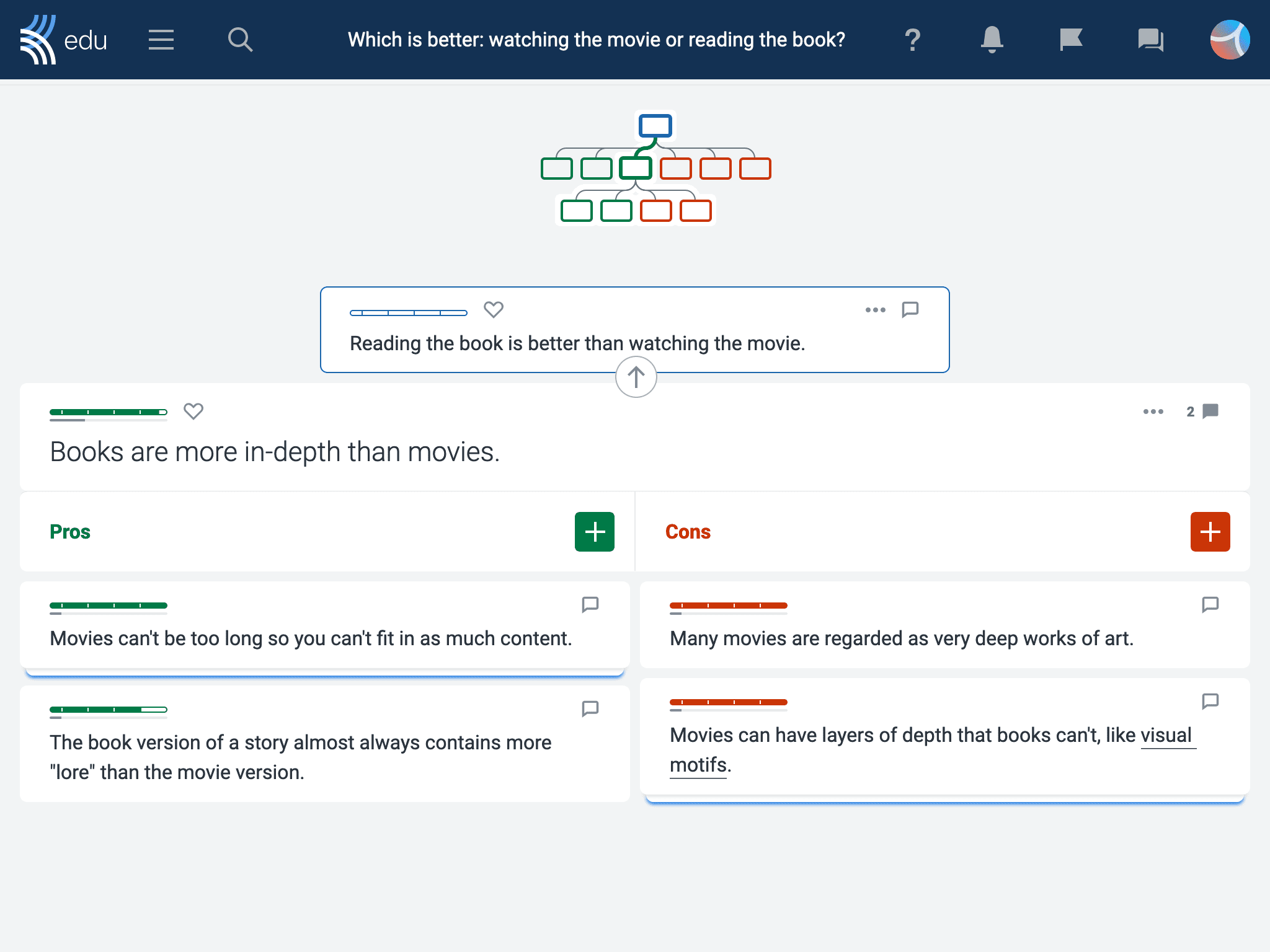Imagine your students as expert communicators, successfully navigating any scenario from participating in class discussions to landing their dream job! One powerful way to build students’ communication skills is through writing practice. Mastering written communication can empower students to communicate confidently in any situation.
So, let’s discover more about the power of writing practice and learn how Kialo Edu’s versatile (and free!) written discussions offer an engaging way to elevate your students’ communication skills!
What are the benefits of having strong communication skills for students?
Equipping students with strong communication skills paves the way for future career success, while simultaneously providing a host of immediate benefits in the classroom.
1. Strong communication skills facilitate learning
Strong communication skills enable students to actively participate in learning and convey their knowledge and ideas effectively through discussions, essays, and presentations.
Moreover, these skills empower students to ask questions, seek clarification, and make connections that help them master lesson content and achieve deeper learning.
2. Strong communication skills help students build relationships
Having strong communication skills means students are able to express themselves with clarity, empathy, and respect: all key qualities for successful relationships. These skills help students navigate social situations and resolve conflicts, building mutual understanding and developing meaningful connections.
3. Strong communication skills enable collaboration
Strong communication skills are the foundation of successful collaboration. When students can convey ideas clearly, listen actively to their peers, and give and receive constructive feedback, they are better able to achieve a consensus and work toward common goals as part of a cohesive team.
4. Strong communication skills support critical thinking and problem solving
Strong communication skills allow students to articulate arguments effectively, reason through information, and thoughtfully challenge each other’s perspectives before finding common ground.
When faced with complex problems, such as whether it’s possible to build cities that don’t harm the environment, students can use open and respectful communication to pool their knowledge, skills, and creativity to generate innovative solutions.
How does writing practice improve students’ communication skills?
Writing practice gives students more time to craft and refine their ideas, compared to the immediacy of spoken communication. This helps students hone a range of communication skills that they can apply across diverse contexts.
Let’s break down the specific ways writing practice elevates students’ communication skills.
1. Writing practice helps students to articulate ideas more precisely
As students compose and polish their written work, they are able to choose the most effective ways to express their ideas. In doing so, students must consider the grammar, syntax, and tone that best suits their purpose and audience. Then, targeted feedback from educators and peers enables them to fine-tune their communication.

This iterative process of drafting, receiving feedback, and refining their written communication supports students in articulating their ideas with greater precision across all communication types.
2. Writing practice improves students’ ability to structure their communication
Written communication requires students to frame ideas carefully to ensure clarity for the audience. Students must formulate, sequence, and organize their ideas logically before expressing them on paper. This practice can translate to improved structure and flow in students’ overall communication abilities.
3. Writing practice enriches students’ vocabulary for precise communication
Drafting their writing gives students time to research and select precise vocabulary to convey ideas. Students can explore the nuances of language, identifying the synonyms that most accurately capture their intended meaning.
As students deepen their command of language, they become more adept at expressing complex concepts concisely and eloquently, whether in written or spoken communication.
4. Writing practice develops students’ ability to communicate critically
Short-form writing tools like argument maps can guide students in critically reflecting on their ideas prior to sharing them with others.
Through this visual structure, students can practice developing extended lines of reasoning, exploring diverse viewpoints, and researching supporting evidence. Importantly, these skills are essential to civil discourse, a form of rational, reasoned communication.
5. Writing practice broadens students’ knowledge base for deeper communication
The thorough research needed for quality writing deepens students’ understanding and provides a richer context from which to explain their ideas. This increased knowledge means that students have a wider range of references to draw from, which allows them to offer in-depth explanations and connect with a more diverse audience.
6. Writing practice boosts students’ confidence in communicating
Writing practice offers students a low-pressure environment in which to build their communication skills — they can rehearse ideas without the immediate fear of making a mistake. This gives students the freedom to experiment with different styles and approaches, boosting their confidence and potentially leading to more self-assured verbal communication.
How do written discussions on Kialo Edu develop students’ communication skills?
Not only are Kialo Edu discussions engaging and productive, their written format also makes them ideal for developing students’ communication skills through writing practice. Let’s discover more!
1. Kialo discussions encourage accurate, concise communication
In Kialo discussions, students develop extended lines of reasoning by crafting precise, concise claims. This focus on short-form communication, instead of lengthy essays, frees up students to carefully select vocabulary and sentence structures that maximize the impact of their claims.

Moreover, when students collaborate in a Kialo discussion, they must write claims that clearly communicate their intended meaning to peers, ensuring that these claims serve as building blocks for further discussion. This prompts them to apply their knowledge of standard English grammar and orthography to write readily accessible claims.
2. Kialo discussions support well-structured, meaningful communication
The branching format of all Kialo discussions supports students in effectively structuring their communication. Connective lines visually represent the relationships between different claims, guiding students to craft focused, single-point arguments that build upon previous contributions. This fosters critical thinking as students must carefully organize their reasoning and ensure their statements remain relevant to the thread of the discussion.
Furthermore, the clear visual layout aids students in following the flow of ideas, supporting them to build sophisticated lines of argumentation and deepen their subject knowledge — abilities that translate to more meaningful communication overall.
3. Kialo discussions maximize communication opportunities for students
Kialo’s text-based discussions allow simultaneous student contributions, maximizing opportunities for communication practice. The format also curbs the difficulties of traditional class discussions: Students can communicate their thoughts without the pressure of public speaking, while Anonymous Discussions let students test out their ideas without fear of judgment. This combination of features creates an inclusive learning environment and maximizes communication opportunities for all students.
Through writing practice, students can hone their skills to master the art of communication. So, if you’re ready to elevate your students’ communication skills, then visit Kialo Edu’s Topic Library. There, you’ll find hundreds of free, inspiring prompts to spark meaningful class discussions and help your students become skilled and confident communicators.
And of course, we’d love for you to communicate with us! Tell us how you’re using writing practice to build communication skills in your students at feedback@kialo-edu.com or on social media.

